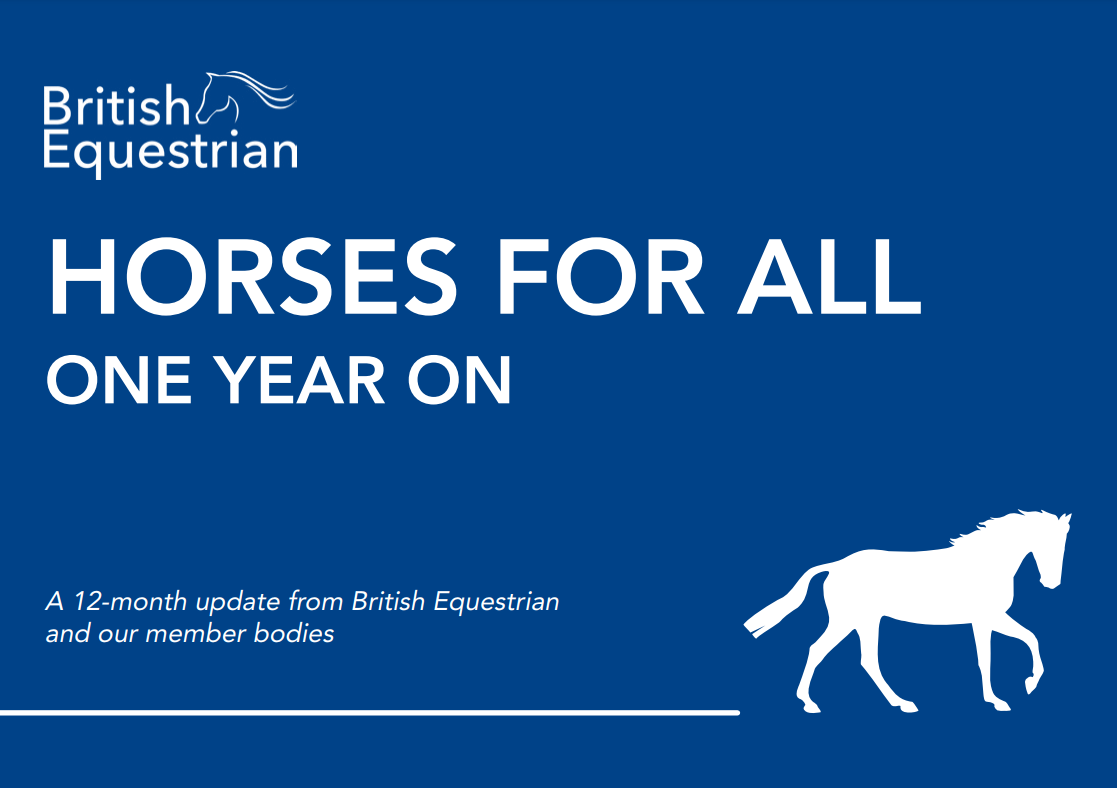Equality and diversity
Our commitment
At British Equestrian, we're fully committed to the principle of equality of opportunity, and aim to ensure that no individual receives more or less favourable treatment on the grounds of age, sex, gender, disability, race, parental or marital status, pregnancy, religion or belief, sexual orientation and gender reassignment. This includes all those involved in different capacities across the industry – participants, employees, coaches, consultants, owners, officials, volunteers and spectators.
On 8 June 2022, we announced a united pledge with our member bodies to make a difference.
We want to make equestrianism, delivered by us and by our member bodies, an activity that's open to anyone who wishes to be involved, in whatever capacity and at whatever level they desire, and to actively encourage a more diverse range of participants and staff. We are committed to equity and diversity, and are on the path to achieving the Advanced Equality Standard.
We already meet the requirement of having at least 30% of each gender on our Board and have done for some time, and we will continue to strive towards gender balance. We're committed to increasing the diversity of the Board to more fully reflect those involved in our sport, and in time the wider population, because we know diverse boards make better decisions.
Horses for All
In 2022, we embarked on a research project to better understand underrepresented communities and their engagement with equestrian activities and sport. Under the banner of 'Horses for All,' we spent ten months working with AKD Solutions gathering data, insight and lived experiences to produce a report which we then delivered a response document which acknowleged we were strong in some areas but needed to make improvements in others to make our industry truly inclusive and equal. Our commitments were laid out over the short, medium and long term and progress continues to be made.
In November 2023, we proudly launched our diversity and inclusion strategy, retaining the title 'Horses for All,' as this is our ultimate aim. This ambitious document was put together with a federation-wide working group with representatives from the industry and leading expertise so we have a representative strategy which provides the vision, mission and objectives which we, and our member bodies, will then use to develop action plans.
Horses for All strategy november 2023
Horses For All report summary and response APRIL 2023
Horses For All six month UPDATE SEPTEMBER 2023

Horses For All: one year on january 2025
What we are doing
We implement our commitments around equity and diversity through an Equal Opportunities and Equality Policy. Following the publishing of our Horses for All strategy, we're currently reviewing this document and we'll publish an updated version very soon.
Diversity and Inclusion Action Plan 2024 - 28
Our Diversity and Inclusion Action Plan details how we'll work to bring the vision and mission outlined in our diversity and inclusion strategy to life and drive the change in culture to achieve our aims - essentially, our 'roadmap'. Launched in September 2024, it covers our short term objectives.
bef diversity and inclusion action plan 2024 - 28
Equity Diversity, and Inclusion Working Group
A group comprising representatives from Member Bodies who lead EDI initiatives within their organisations. The group’s aim is to enhance equity and accessibility in equestrian sport, ensuring that anyone who wishes to participate has the opportunity to do so.
The purpose of the EDI Working group is to:
- Act as the steering group for activating the Horses for All Strategy, the federation-wide Diversity and Inclusion (D&I) strategy; overseeing the broader aspects of the BEF Diversity and Inclusion Action Plan (DIAP) in relation to actions relevant to the whole federation and reviewing member body progress towards the development and adoption of their own EDI action plans.
- Championing EDI across the federation beyond their own member organisation.
- Encourage greater engagement and collaboration through sharing best practice and knowledge - discussing matters of importance and finding the best ways of cascading the message up to the Boards and down to the federation members’ staff.
- Promote a consistency of communication on areas of shared interest and activity.